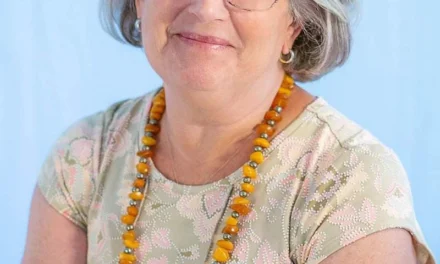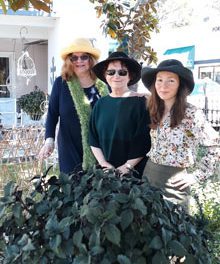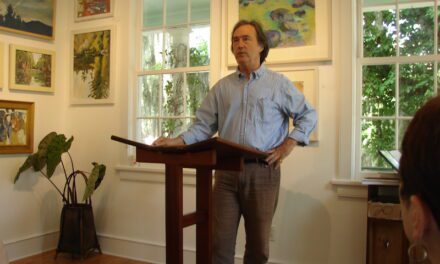Pat Conroy talks about his new book, his old friends, the city of Charleston, the state of publishing, his Catholic faith, Hollywood, and re-imagining Santini… among other things. By Margaret Evans, Editor
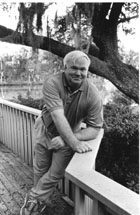
“Now that I’ve been alerted, I develop an eye for circles and the strange power they exert over human connections.”
From South of Broad by Pat Conroy
Driving out to his wooded home on Fripp Island, I find myself pondering the line above, which falls, rather pointedly, near the end of Pat Conroy’s long-awaited new book South of Broad, his first novel in 14 years. As I roll slowly over the Fripp bridge, savoring the familiar tang of salty air, the madcap squawk of seagulls takes me back in time like a favorite old song on the radio. I am returning to a place I once lived briefly, to interview a man I once worked for briefly, a widely-celebrated author I interviewed once before, over 15 years ago, thus launching my own modest writing career. It occurs to me that were it not for that long-ago interview – the one he so generously granted a young, unpublished research assistant – chances are very, very good I wouldn’t have this job I love so much today. I wouldn’t be heading to the island home of a world famous writer – at his invitation! – to interview him for my newsweekly. I’m pretty sure I wouldn’t have a newsweekly.
I pass through the gate, turn onto the palm-lined street I traveled so many times before, so long ago, and pull up to a house that hasn’t changed much in 15 years, though most everything else has.
Pat Conroy believes in the power of circles, and so do I.
Margaret Evans: This idea of circles seems central to South of Broad. The story revolves around a group of friends who meet in Charleston on Bloomsday in 1969. It turns out to be a fateful day, and as the novel unfolds, these friends are bound together – and torn apart – by forces beyond their control. We follow them from the late sixties’ integration of schools in the South to the eighties’ AIDS epidemic in San Francisco and back to Charleston for Hurricane Hugo. As the novel ends, we find these friends together again on Bloomsday, 20 years later. Almost as if they’ve come full circle…
Pat Conroy: I believe in these circles. There was a girl I had a huge crush on in 8th grade. Her name was Janet Tatou. I used her as an incidental name in Beach Music, just sort of a little tribute (I like to do that). So one day in the mid-90s, I’m at First Presbyterian in Beaufort with my good friend Julia Randel (Miz Randel makes me go to church with her once a year), and this guy taps me on the shoulder and says, “How do you know Janet Tatou?” I say, “I was in love with her in eight grade.” He responds, “She’s my lawyer.” So I get her number and call Janet, who now lives in Camden, and she doesn’t remember me. At all. She has no recollection of being the first girl I ever danced with. I say, “That’s okay, nobody ever remembers me. I moved from school to school. I was there for nine months, then I was gone.” She says, “Well Pat, this is just amazing! I married a Citadel graduate. And our son just graduated from The Citadel, where he majored in English… because he loves your books. “
M.E. A circle?
P.C. A circle. I run across them all the time. I thought about you coming out here today to interview me for your paper. I still cannot drive across the Fripp bridge without thinking about how your dad got a speeding ticket the first time he came out here to visit you – what, 17 years ago? – and you were so mad, you went roaring down to the gate and bawled out the security guard. I get so tickled every time I think about it! So many years ago, but here we are. Another circle.
M.E. Good grief, I had forgotten all about that! Your memory may be your greatest gift as a novelist. It takes a strong memory – and a certain kind of vision – to recognize the circles.
So, now you’ve circled back to Charleston. In South of Broad, one could argue that the city is more than just a setting… it’s a main character. You write: “I carry the porcelain beauty of Charleston like the hinged shell of some soft-tissued mollusk. My soul is peninsula-shaped and sun-hardened and river-swollen….” That’s vintage Conroy right there. Your fans will swoon! But why set another book in Charleston? What does the city mean to you? What about South of Broad, specifically? 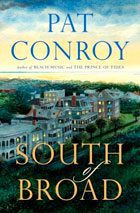
P.C. Gene Norris was the one who first took me to Charleston. He was my English teacher at Beaufort High, and a big antique buff, and he used to take me on these excursions. He’d say, “Boy, we’re going ramblin’.” I think that was for my dad’s benefit. Ramblin’ sounded more manly than antiquin’…” Anyway, it was quite the production. First, he took me to “The Four Corners of Law.” You’re on Broad Street, you come to Meeting Street, and across the street, caddy corner, is City Hall. To your left, is the State Government building, to your right is the PO and federal courthouse, and then St. Michael’s Church (representing God’s law). So, he explains all this, then says, with a great flourish, “And now, when I make this turn, boy… it’ll change your life forever. Because I am turning… South Of Broad. It’s something special. Everybody in South Carolina has to establish how they fit, or do not fit, into South of Broad. Doesn’t matter if you’re black or white, rich or poor, Catholic or Protestant or Jewish… South of Broad becomes sort of a mythical place that you have to identify with and know about and measure yourself against. And one thing I know for sure – you’ve never seen a more beautiful place in your life.”
Then he turned, and said, “Welcome to South of Broad.” And he was right.
I still think Charleston’s one of the most thrilling cities to walk around in. (Novelist) Anne Rivers Siddons has moved there, and she has the best guest house in the world. It just happens to be South of Broad. I stayed there a lot while writing this book…
M.E. You’ve said that Gene Norris was your inspiration for the character of Harrington Canon, the antique dealer, in SOB. What about the other characters? Based on anybody we know?
P.C. The character of Sheba Poe will be recognized by people my age who went to Beaufort High in the early 60s… they’ll know instantly who she is. I gave this woman’s eulogy some years ago, and said, “My only surprise about her death is that it was not the lead story on CNN World News.” We’d never seen anything like this girl! Gorgeous? God Almighty, when she walked into that classroom… And she was heroic. I lived behind her in Laurel Bay, and all the Marine wives loved her. Her mother had left her father, and she was raising her younger brothers and sisters… made all their clothes, cooked for them… She had a big influence on me.
M.E. But this girl never actually became a movie star, like Sheba?
P.C. No, she did some modeling, acted in soaps… but it never quite worked for her. So in this book, I decided to give her a Hollywood career. It’s one of the ways a writer can change the world….
M.E. Sheba Poe is a memorable character, indeed. And such a big character. So big, in fact, that I’m actually surprised she’s based on a real person! Speaking of which… some critics have called your writing “over the top,” accusing you of hyperbole – everything from your prose style, to your characters, to your storylines. Forgive me for saying it, but I don’t think South of Broad will rid you of that reputation. How do you respond to the accusation?
P.C. I remember being interviewed by a woman in New York who didn’t like The Prince of Tides one bit. She kept saying it was “overwritten, overdone… “ all the usual stuff. So I asked her for examples. She says, “Well, this chapter about the white porpoise, for instance… I mean, come ON….a white porpoise? “ I said, “Nope, that really happened.” And I told her the story of Beaufort’s white porpoise. Every example she threw out, I’d say, “Nope, that really happened, too.” She just kept ticking them off and I just kept saying nope. “The South’s like that,” I told her. “And here we are in New York City… and New York City’s even more like that. I’ve heard stories in this city I certainly can’t believe, and yet, they seem to have happened.”
M.E. Well, some pretty unbelievable stuff happens in SOB, too. In fact, there’s a really shocking revelation at the end of the book, wrapping up a long-standing mystery. I seriously did not see it coming.
P.C. Neither did I! When I realized that was going to happen, it blew me away.
M.E. You mean you hadn’t planned to end the book that way?
P.C. No, I never know how these stories are going to play out. I come up with these characters, and they’re usually loosely based on people I’ve known, or composites of people I’ve known. But then they start to change on me. And they start doing things I’d never dreamed of. The story literally takes on a life of its own…
M.E. Speaking of characters… I love your protagonist, Leo King (aka “Toad”). He’s the heart and soul of the novel. But a close second is his father, Jasper King, who’s probably my favorite character in the book. It occurs to me that this may be the first Good Father you’ve ever written in a novel.
P.C. Jasper King is definitely my first Good Father. My dad once told me I’d never be able to write about a good father. You know, Dad went nuts over The Great Santini when it came out. Hated it… went crazy! He had this image of himself as the perfect father and perfect husband. I said, “Let me correct you, Colonel; you were the worst father and the worst husband I’ve ever seen! Every one of your kids hated your guts, and then Mom left you, and she hated your guts. I’m sorry this book hurt your feelings. It does not make up for my ruined childhood. By the way, they didn’t believe it when I first wrote it, so I had to put things into the novel to make you believable. To make you nicer. In the book, he gives his son the flight jacket on his birthday. That never happened. He sends his daughter roses on prom night. That never happened… “
So what Dad did, and it was a great surprise to me – and the subject of my next book – he changed. He found it in himself to change. I don’t know where he found it. He wanted to prove me wrong, or something. But he changed. And he did a good job.
M.E. I guess maybe your words hit home, and he felt genuine contrition?
Are you kidding me? He felt no contrition! It was more like a challenge to him. This was not a contemplative man we’re talking about. He never apologized. Never expressed remorse. He just changed. Which was good enough for me. But he did say, later, something like, “When you write the word 'Father,' it’s always going to be complicated for you, because of our relationship. You’ll never be able to write it without thinking of me.” For a long time, he was right. But while writing this book, I didn’t think of him. And I absolutely love the father character. I fell in love with the guy!
M.E. Is Jasper based on someone in particular?
P.C. I didn’t know this when I was a kid… but I re-fathered myself again and again. There were all these great men, a million men, and it started in Beaufort. Gene Norris, Walt Gnann, Morgan Randel… and so many others. Later on, too. How about the Boo, for God’s sake? Other kids didn’t have a need for this, but obviously I did. By the way, I re-mothered myself, too. Mom had seven kids, and was just spread too thin, so I adopted these wonderful women like Ellen Harper and Julia Randel… When you get down to it, I think I re-parent myself in these books, too.
M.E. About re-mothering… Leo’s mother in SOB is a piece of work. A James Joyce scholar who also happens to be a former nun.
P.C. One subject I’m certain about when I write is the American Nun. Nuns taught me from kindergarten ‘til the time I came to Beaufort High. They tickled me… God, did they tickle me. There was one I was terrified of, though: Sister Patra – she would hit with her fist. No ruler on the knuckles, like the others… her fist! I nicknamed her The Red Cross, ‘cause she took so much blood from our bodies. (I used her as a model for one of the nuns in this book.) But for the most part, I really loved these nuns … they were mostly just smart women who wanted to make you smart. I’m the only one among all my friends who can diagram a sentence, thanks to those nuns…
M.E. So, let’s talk about the Catholic thing. This is the first of your novels to feature a devout Roman Catholic as its protagonist. I recently read an essay of yours, “Confessions of an Ex-Catholic”…
P.C. What?! Where did you find that? I wrote that essay in 1974!
M.E. You really need to acquaint yourself with the Internet, Pat. It’s a very helpful tool for a writer. Anyway, in the essay, you wrote, “I love the Church. I hate the Church. I am through with the Church. But I am still as Catholic as the Pope.” I found your writing about the Catholic faith to be some of the most beautiful prose in this new book. Do you still consider yourself an ex-Catholic?
P.C. I no longer believe there’s any such thing as an ex-Catholic. I’m a Catholic, period. And there was a time in my life when I was as devout a Catholic as any kid you ever met. An altar boy. A daily communicant. But I was bushwhacked by Vatican II. When I was in college, there was this opening up of the Church that I just found magical. I thought, “this is gonna be great!” But then it all fell apart. The Pope had died, and the new guy came in, and he was severe, and he cracked down. It was all too reactionary and conservative for me. I had a crisis of faith at the Citadel. I went to the chaplain there, and said, “I’m losing my faith. I want you to give me communion every day. I want to try to fight this thing…” So senior year, I took communion every day. Nobody else was doing it, so that poor priest had to show up just for me. Every single day. And he stuck with me. It didn’t quite work. I still struggle. But you can’t stop being a Catholic. There’s no question this thing is strong within me. I love the language, the prayers, the chants, the beauty and majesty of it all. I think I’m the kind of writer I am today, in part, because of it. And I'm still a believer. But this is a strict church. According to the laws of the Catholic Church I will go to hell.
M.E. Well, all you have to do is confess on your deathbed, right?
P.C. That’s exactly what my dad used to say about himself! I said “Dad, give me a break! You’re the worst Catholic I’ve ever seen.” And he said, “Son, that’s your opinion. Fortunately, it’s not the one that counts. And by the way, all of you kids will chicken out on your deathbeds and call for the priest…” And I said (laughing), “Sure. I’ll probably do that. Why take a chance?!”
As you know, my mother was a "primitive" Baptist. She converted and became a fanatic. She wrote Pope Paul and congratulated him for his encyclical against birth control. He wrote her back. It was the most exciting thing that had ever happened to her. I was in college, and a real wise ass at the time, and I said, “Mom, what did you expect? It was the only letter of support he got! You’re the only one in the world who supports this guy, and we’ve got 95 kids in this house to prove it….”
M.E. On a lighter note… at this point in your career, are you a bit tired of promoting the ‘Legend of Pat Conroy’?
P.C. (Roaring with laughter) “Promoting the legend of Pat Conroy” has not been my favorite thing since the beginning… It sounds so ridiculous even to hear you say it!
M.E. Well, it’s a fact that people seem intrigued with you in a way that transcends typical reader/writer admiration. More than just your books, they’re fascinated with your life. With your life style. We don’t have many “celebrity writers” anymore, but you are one. For instance, I hear the Today Show was in Beaufort yesterday, talking to the folks at Bay Street Trading Company about you.
P.C. Yeah, they came out here to the house, too, and we cooked for them. It was a lot of fun. And before you came out today, a guy from the Wall Street Journal was here. All he wanted to talk about was Highlands, NC. He’s from there and I’ve been there, so that’s what we talked about.
M.E. When you first started writing, did you ever think you’d find yourself in this position? Cooking for the Today Show? Chatting with the Wall Street Journal? Hobnobbing with the New York Times?
P.C. Are you kidding? When I first started writing, I had no idea anybody would publish me. I’m still surprised.
M.E. Well, I’ve been reading reviews of SOB on Amazon, and the phrase that comes up over and over again to describe you is “American Master.” You are widely considered an American Master. How does that feel?
P.C. (Pause.) It feels… great… but so odd. It seems like only yesterday I was at a funeral down in Piedmont, Alabama – I’d just published The Water Is Wide – getting my feelings hurt. I overheard a second cousin of mine say, “He may think he’s really big, but I notice he’s never been in Celestine Sibley’s column… and he ain’t never been in Southern Living.” I was mortified. So when I got back to Atlanta, I called Celestine Sibley (a columnist for the Journal Constitution) and said, “Celestine, will you write about me in your column this weekend?” And she said, “Okay. What do you want me to write?” “Something rapturous!” I replied. She came through. And then I called Southern Living. I knew a guy there, and I asked him if I could write an article for the magazine. He said, “Hmmm… well, we need one on Herschel Walker.” I said, “I’ll do it!” And I did. And I silenced that second cousin for all time.”
M.E. And, if that didn’t do it, all those movies probably did! Any Hollywood interest in SOB yet?
P.C. Not that I know of.
M.E. What about Beach Music? They’ve been talking about that movie for over a decade now. At one point, Brad Pitt was attached. What happened?
P.C. There’ve done rewrite after rewrite on the script. It’s still hanging out there. I haven’t heard anything in a while.
If they made Beach Music or a movie of this book today, they’d make it in Wilmington, NC. South Carolina’s priced itself out of the game. We’re going to have to do better by Hollywood if we want to get the movie business back here. They came here because it was cheap and pretty, and it’s not cheap anymore. It’s just pretty. The tax breaks, the financial incentives that used to exist… they don’t exist anymore. Canada passed some laws, and suddenly every movie I see is made in Toronto, made in Vancouver… Hollywood doesn’t even think about South Carolina anymore.
M.E. I notice that you still write in longhand on yellow legal pads, Pat. No wonder it took you five years to finish this book!
P.C. My wife Sandra (novelist Cassandra King) got me this typing program I’m supposed to be working on. I keep telling her ‘”I’m old! It’s hard!” But I’m pecking away at it…
M.E. At least you’ve got this beautiful antique writing desk to ease your pain…
P.C. Gene Norris made me buy this desk. He said, “Boy, when you write, you need to write on somethin’ worthy!”
M.E. When I worked for you on Beach Music, you penned a much longer book than Doubleday ended up publishing. How much of SOB hit the cutting room floor?
P.C. Well, my original manuscript was 1200 handwritten pages (about 800-900 typed). The book is now just over 500. I always overwrite, and I knew I was going to have to make some cuts. It’s a strange time in publishing. They’re not publishing as much, and they want you to go shorter. They’d have loved it if I’d written a haiku or a couplet.
M.E. Things have definitely changed in the publishing industry. A lot more folks are self-publishing these days.
P.C. My friend Scott Graber wrote a beautiful book (Malachi) that I have no doubt would have been published ten years ago, in a different climate. But he ended up self-publishing. Bernie Schein found a publisher for his book (If Holden Caulfield Were In My Classroom), but he’s been doing a lot of his own marketing. To his credit, he’s discovered how to navigate the Internet. He’s involved in all that stuff… what’s it called? YouTube? Facebook? Anyway, he’s figuring it all out and doing very well with his book…
M.E. How much do you care about pleasing the critics? Do you read your reviews?
P.C. I quit reading them after The Water Is Wide. But unfortunately, your best friends always tell you about the bad ones! Bernie Schein’ll call me up and say, “Did you read what that jerk wrote about you in the such-n-such paper?” So you’re always aware. But you know how it is, Margaret. You’ve been writing for a long time now. There are always some people who like what you do, and some people who don’t. Nothing you can do about it.
M.E. In my case, it still hurts when they don’t.
P.C. Mine, too.
M.E. South of Broad features one of your favorite recurring themes: The Troubled Childhood. You’ve got the glamorous Poe twins, whose parents are both complete nightmares. You’ve got the orphans, Niles and Starla, who have a troubled parental history, too.
P.C. I worked in an orphanage my junior and senior year at the Citadel. A more Dickensian place you’ve never seen! I used to get the orphans free tickets to the basketball games, which they loved. Later, I talked to this guy who had been put in an orphanage with his sister. They had to wear these uniforms, and they had to march… it was so humiliating. He was a nice looking kid, and a good kid, and he fell in love with a doctor’s daughter. When the doctor and his wife found out, they put an end to it immediately.
M.E. Which reminds me… in the characters of Molly, Chad, and Fraser, you give us kids from “good families” growing up South of Broad. Their parents aren’t exactly angels, either. You seem to be suggesting that this sort of “society” upbringing is its own kind of crucible…
P.C. It can be tough. There’s tremendous pressure on every child raised South of Broad or in Charleston society….
M.E. Some of the characters in SOB manage to rise above their difficult childhoods and find emotional health and happiness as adults. Some of the Bad Parents even redeem themselves. Which brings me back to something you said earlier… about your next book… ?
P.C. I’m writing about a father who changes. I feel like I owe it to Dad. The man lived through a lot. Three wars… a son who committed suicide… He lived through a lot.
M. E. So you’re giving Santini a second act.
P.C. See what I mean about circles?
####
Pat Conroy will be signing copies of South of Broad from 1-4 pm on Saturday, August 29 at Bay Street Trading Co, in downtown Beaufort. For more information call 524-2000.

